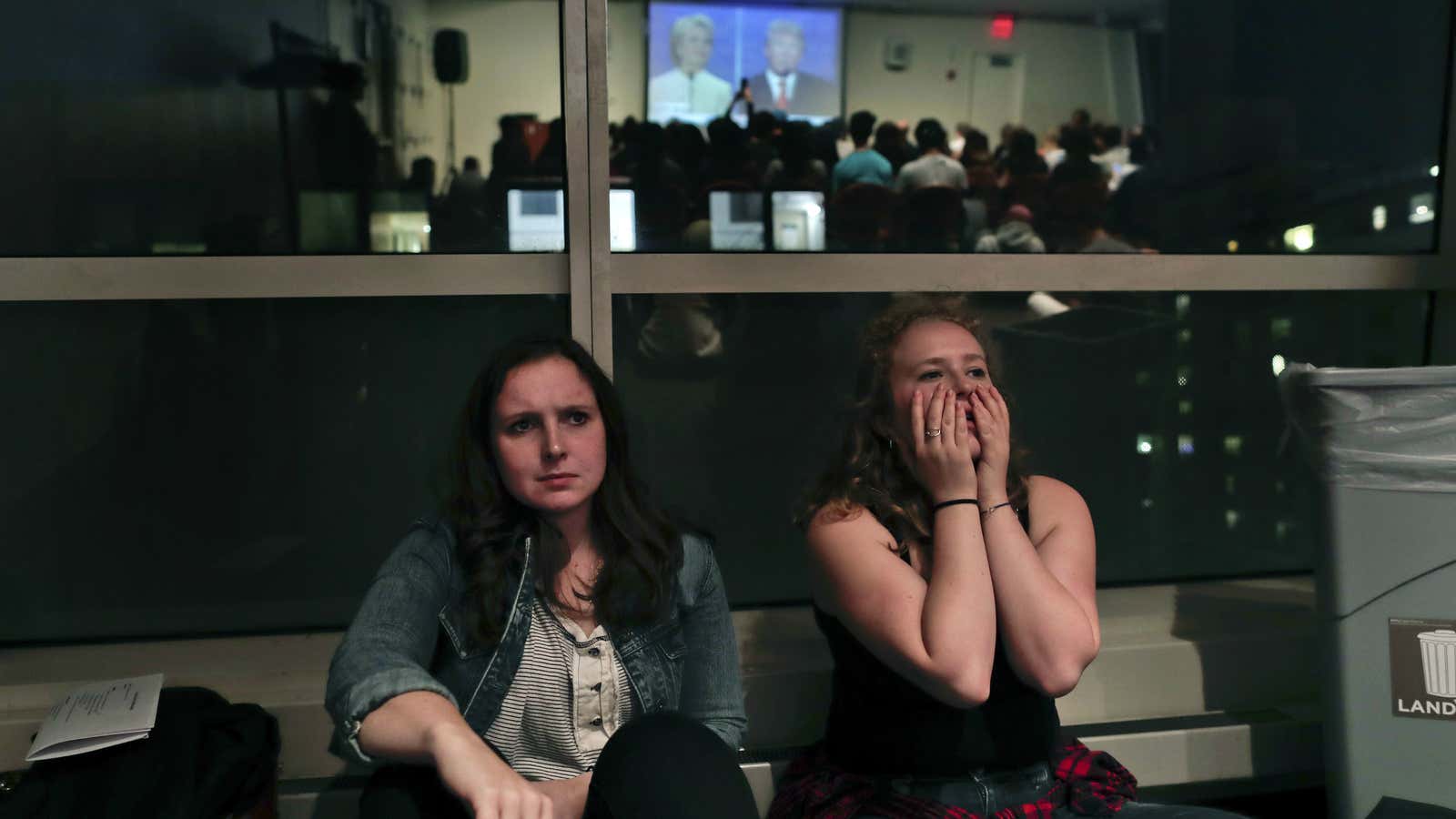In the subway, on the street, in line at the grocery store, at a bar counter—all across America, fallout of the year’s savage Trump-vs.-Clinton psychodrama is inescapable. Like no election in recent memory, this race has taken a toll on people’s mental health.
The stress probably has something to do with Donald Trump’s strategy for rising to the top of the ticket: by whipping up raw emotional populism to attack US democratic and civil institutions. The Republican candidate’s success relies on manipulating emotions to inspire fierce loyalty and inflame a sense of victimhood among his supporters, encouraging them to impugn the rights and integrity of outsiders. Those who disagree with him are dismissed as immoral or ignorant—most notably Democratic candidate Clinton (whom he’s allowed his supporters to believe is a literal demon).
His morality-based case for the presidency has collapsed the democratic customs of mutual trust and respect that let such a diverse group of Americans decide how to live together. So is it any wonder that this election has left the people feeling psychologically bruised and chafed?
United States of anxiety
Thanks to a crop of recent surveys, this mass mental trauma is quantifiable. More than half of all Americans say the 2016 election is a very or somewhat significant stressor in their lives, according to a study on election stress (pdf) by the American Psychological Association (APA).
Nearly half of workers surveyed by the APA said people are more likely to bring up politics in the workplace this election season than in the past. Around a quarter of millennial employees felt stressed out by political conversations at work, according to the APA. In general, millennials and retirees seem to be sweating this election more than others.
Women and girls are particularly vulnerable to the election’s mental impact. Some 42% of girls said Trump’s comments about women had changed how they think about their bodies, found a national poll conducted by the New York Times. Some ethnicities are struggling more than others, too.
Three-fifths of respondents reported that the election climate is causing them high stress, in a randomized survey by Talkspace, a provider of online therapy. In the study, which was conducted by Survey Monkey in late October, nearly 40% of respondents said the election is intensifying anxiety, while around a third said it’s hurting their outlook on life. One in five have actively sought help for their election-related mental health woes.
Negative emotions crescendoed during each of the three presidential debates.
Why is this election freaking Americans out so much?
While a lack of historical comparisons mean we can’t know for sure, anecdotally, this year’s psychological toll is an order of magnitude greater than the usual quadrennial jitters.
“It could be how negative the whole campaign is, the discord is particularly heated, we seem to be more polarized,” Lynn Bufka, the APA’s associate executive director for policy, told the Washington Post.
Jor-El Caraballo, a New York City-based therapist and mental health advocate, says his clients are much more stressed out than they were in 2012, particularly around the time of each debate. Election rhetoric is reviving flashbacks of hate, violence, and abuse among some of his clients. A huge factor is the powerfully negative emotions Trump airs about women and minorities.
Some of his more left-leaning straight male clients are also struggling with the generalizations about men that this election has kicked up.
“No matter what reference group it is that people are a part of, they all feel very isolated because of the polarization,” says Caraballo.
Dread, distrust and isolation
Democracy is designed to let people with different interests decide the rules of how to live together so that, even though some will always wind up dissatisfied, they’ll all accept the decisions as fair. But Trump is undermining this process. His frequent refrain that American democracy is “rigged” invites his supporters to abandon the structures that protect everyone’s peaceful coexistence.
The unease Americans are feeling is a sign of how his psychological games is damaging democracy. While democratic process is supposed to be about rational debate and a fair system of representation, Trump has instead made the process about emotions. He has twisted American democracy into something visceral, not rational.
As he dominated Twitter and cable new, Trump forced Americans to see themselves as he did: nothing more than demographic groups. He then fit these groups into his good-vs-evil worldview, pitting whites against Latinos, gays against Muslims, men against women—”real” Americans versus cartoon villains. Others—e.g. not-totally-skinny women, women accusing him of sexual assault, Elizabeth Warren (“Pocahontas”)—he just ridiculed. At the same time, he has convinced his supporters that they’re being exploited and preyed upon by others.
What grips America now is the fear and dread that comes from distrust. Today, Trump closes out his campaign having taught everyone—supporters and non-supporters alike—to fear that they’re a victim, a lesser participant in America’s democracy. And that’s really pretty stressful.
